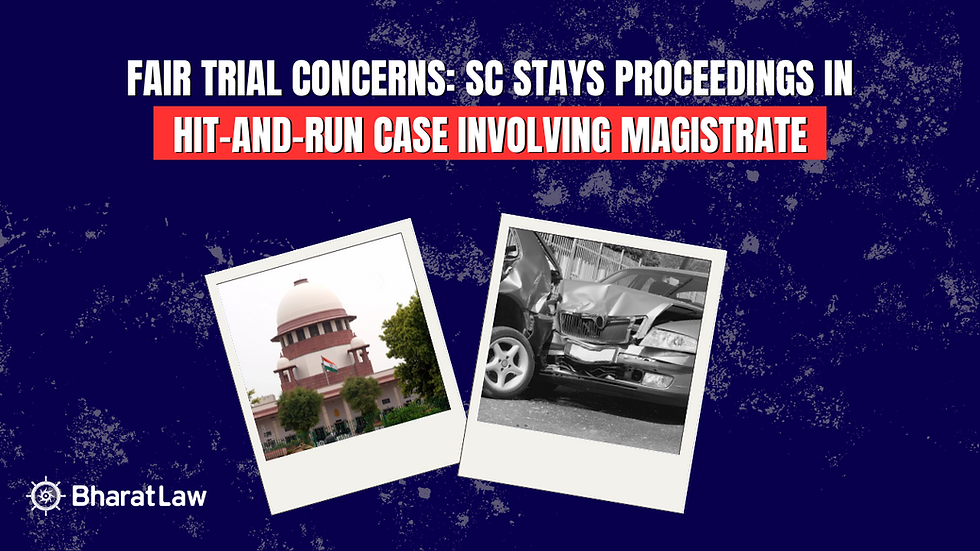Litigants Cannot Stall Public Interest Projects: Supreme Court's Landmark Ruling on Slum Redevelopment
- Chintan Shah

- Feb 28
- 4 min read
Summary of the Judgment
Case Name: Mansoor Ali Farida Irshad Ali & Others v. The Tahsildar-I, Special Cell & Others
Date of Judgment: 27th February 2025
Judges: Hon'ble Justice Sudhanshu Dhulia and Hon'ble Justice Krishnan Vinod Chandran
Advocates: Representation from both the appellants and the respondents, including government counsel
Acts & Sections Involved:
Maharashtra Slum Areas (Improvement, Clearance and Redevelopment) Act, 1971 (Sections 33, 38, 35(1A)),
Maharashtra Housing and Area Development Act, 1976,
Development Control Regulations for Greater Mumbai, 1991 (Regulation 33(5), 33(10))
Cited Judgments:
Various precedents on slum redevelopment, rehabilitation, and property rights
Introduction
The Supreme Court of India, in its ruling on Mansoor Ali Farida Irshad Ali & Others v. The Tahsildar-I, Special Cell & Others, addressed critical issues concerning slum rehabilitation and the jurisdiction of the Slum Rehabilitation Authority (SRA) under Maharashtra law. The case originated from a dispute regarding the redevelopment of a slum cluster, where the appellants challenged their eviction from the premises designated for rehabilitation. The judgment provides a comprehensive interpretation of legal provisions, reinforcing the state's role in slum redevelopment.
Background of the Case
The case arose from a notice issued on 06.12.2022 by the Slum Rehabilitation Authority (SRA), directing the appellants to vacate their premises within 48 hours for redevelopment. The appellants had previously challenged a similar 2019 notice before the Apex Grievance Redressal Committee (AGRC), which dismissed their plea in June 2019. Despite the dismissal, the appellants failed to vacate the premises, leading to another eviction notice in 2022, which was subsequently challenged before the Bombay High Court and dismissed on 04.01.2023.
Key Legal Issues Examined
1. Validity of the Slum Rehabilitation Project
The appellants contended that their land fell under the Maharashtra Housing and Area Development Authority (MHADA) and not the SRA, arguing that only MHADA had the authority to redevelop it under Regulation 33(5) of the Development Control Regulations (DCR). However, the Court clarified that the land, though owned by MHADA, was classified as a censused slum under Regulation 33(10), making it eligible for SRA-driven rehabilitation.
"A censused slum, as per Regulation 33(10), does not require a separate declaration under Section 4 of the Slum Act. It is already included within the purview of slum redevelopment."
Thus, the argument that the land had to be exclusively redeveloped by MHADA was deemed meritless.
2. Lack of Consent of 70% Slum Dwellers
The appellants further argued that the redevelopment scheme did not obtain the mandatory 70% consent of slum dwellers as required under the DCR. However, the Court, after reviewing records, found that over 70% of the eligible residents had agreed to the project. The Bharat Ekta Co-Operative Society, representing slum dwellers, had approved the rehabilitation, and the development was already in an advanced stage.
"The project has the requisite approval of the majority of slum dwellers, and the appellants cannot derail the rehabilitation process on grounds that have already been examined and dismissed by competent authorities."
3. Appellants' Status as Slum Dwellers
A crucial point of contention was whether the appellants were bona fide slum dwellers. The AGRC and the Bombay High Court had earlier found that most of them were transit camp tenants rather than original slum dwellers. They were temporarily housed due to road expansion projects and were not entitled to the benefits of slum rehabilitation.
The Supreme Court upheld these findings, stating:
"The appellants, as transit camp tenants, do not enjoy the same rights as the original slum dwellers eligible for rehabilitation under the Slum Act."
4. Doctrine of Finality and Laches
The Court observed that the AGRC order from 2019 was never challenged, and the appellants waited for four years before approaching the Bombay High Court. Their failure to challenge the previous adverse ruling indicated a lack of due diligence, making their petition untenable under the principle of finality.
"Litigants cannot be permitted to sit idle on their rights and approach the Court at a belated stage merely to stall public interest projects."
Supreme Court's Observations and Rationale
The Supreme Court, in its judgment, made several key observations reinforcing the necessity of slum redevelopment in urban areas like Mumbai. The Justices highlighted:
The importance of slum rehabilitation as a welfare measure to improve the living conditions of slum dwellers.
The legitimacy of the SRA’s jurisdiction in implementing redevelopment projects under the Slum Act.
The futility of the appellants’ arguments, which had already been examined and rejected by multiple authorities.
The advanced stage of the project, where most slum dwellers had already been relocated, making further intervention disruptive.
Conclusion
The Supreme Court's decision upholds the authority of the Slum Rehabilitation Authority (SRA) and strengthens the legal framework governing slum redevelopment in Maharashtra. This judgment establishes the following key takeaways for legal professionals and urban policymakers:
Censused slums do not require separate notifications for redevelopment; they automatically qualify under Regulation 33(10) of the DCR.
Transit camp tenants cannot claim the same rights as original slum dwellers in redevelopment projects.
Failure to challenge an adverse order in a timely manner can bar future claims under the doctrine of laches.
Once a majority of eligible slum dwellers consent to a project, a few dissenting individuals cannot obstruct its implementation.
The ruling sets a precedent for future disputes involving slum rehabilitation, reinforcing the judiciary’s commitment to balancing urban development with social welfare. For legal professionals advising on property and urban law, this case serves as a guiding framework on the hierarchy of statutory powers, rights of slum dwellers, and judicial review in rehabilitation matters.



Comments